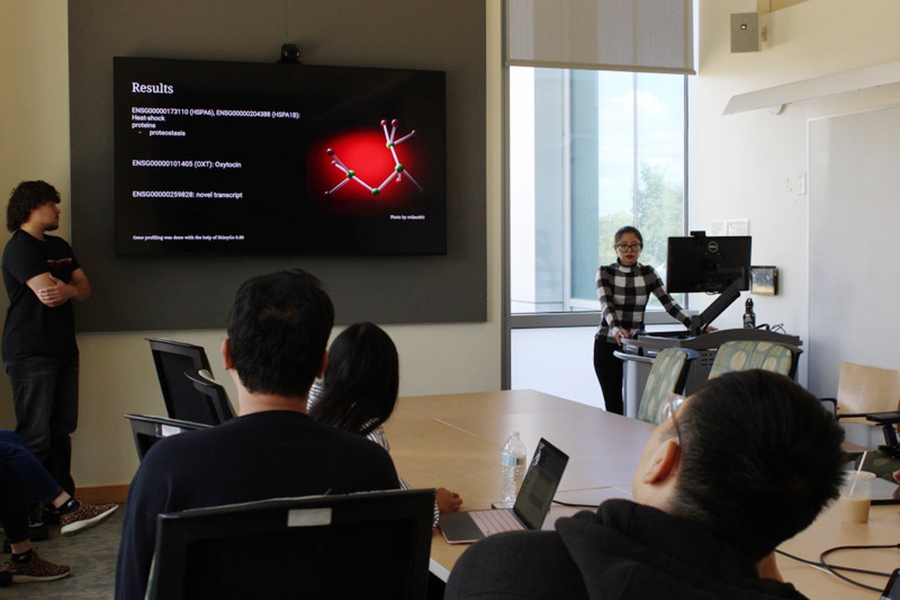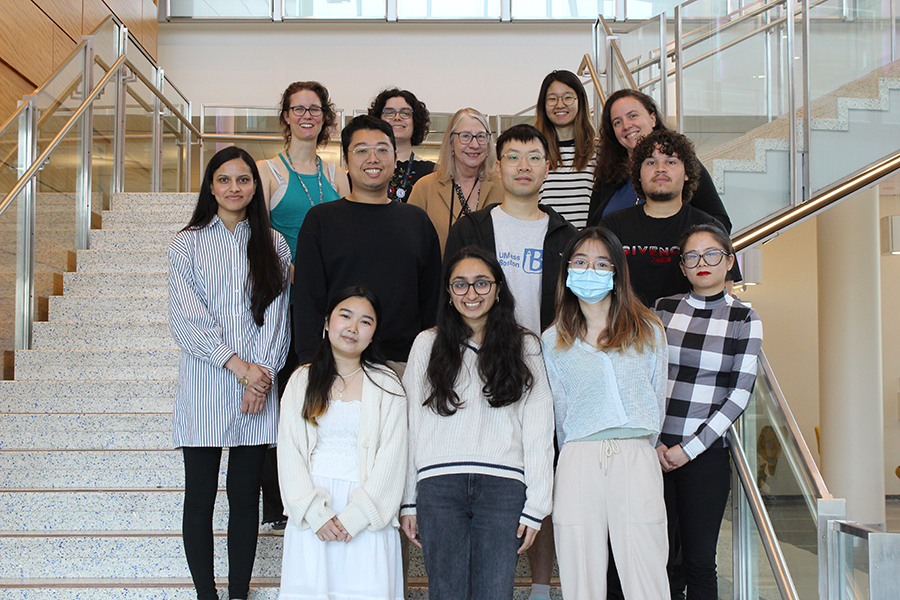- Home
- News
- Recent News
- UMass Boston Launches Campus-Wide Microcredentialing Initiative
UMass Boston Launches Campus-Wide Microcredentialing Initiative
UMass Boston is piloting a new campus-wide microcredentialing initiative as part of its ongoing efforts to help students prepare for entry into the workforce and give community members the opportunity to update or expand their skill sets.

The initiative currently includes three new noncredit microcredentials : Introduction to Offshore Wind, iTCGA Research Immersion in Cancer Genomics, and a Resident Assistant program.
Microcredentials are competency-based, short, and flexible programs of study designed to develop specific in-demand skills. They can be in the form of a course, a series of courses, or a professional training program, and correspond to a badge that can be shared on social media as a digital verification of skills.
These short, targeted learning experiences are gaining traction as they engage diverse learners and meet the needs of an evolving workforce in a highly dynamic workplace, according to Tina Chang, assistant provost for community and executive education. Bureau of Labor Statistics data reveals that the average person holds approximately 12 jobs from the ages of 18 to 56. To this end, microcredentials can promote lifelong learning and support our students throughout their career paths.
United in our common goal to expand educational pathways, several teams across campus came together to assist in launching the pilot microcredential initiative, including Academic Affairs: the School for the Environment, College of Science and Mathematics, Registrar, and Community and Executive Education, ITS: Learning Design Services, Marketing and Engagement: Digital Marketing and Creative Services, and Student Affairs: Residence Life and the Office of the Dean of Students.
“Microcredentials are a value-add for UMass Boston students, faculty and staff, as well as community members, especially our trusted employer partners that look to us for a full range of learning and training opportunities,” said Chang, who is leading the initiative. "Growing numbers of employers invest in microcredentials to upskill and reskill their staff to enhance their talent recruitment and retention efforts.”
The microcredential working group has appreciated the feedback from faculty, staff, and students who have participated thus far. Through everyone’s efforts, they were able to build the early infrastructure, policies, and practices to begin to offer more noncredit microcredentialing opportunities at UMass Boston.
If you are interested in piloting a noncredit microcredential, please visit the university’s microcredentialing initiative page at Microcredentials - UMass Boston (umb.edu).
Bob Chen, a professor in the School for the Environment, led the first Introduction to Offshore Wind microcredential course this summer. Students virtually experienced traveling to an offshore wind farm and climbing to the top of a wind turbine, he said.

“The students came from diverse backgrounds, from different countries, and different disciplines. …They learned about offshore wind as a future clean energy source, and in active groups developed plans about how to optimize wind farms, co-locate them with aquaculture farms, and design them to maximize coastal community co-benefits— all in a single 6-hour session!” he said.
“Seeing this enthusiasm for a rapidly evolving career opportunity suggests that microcredentials are an engaging, low barrier, adaptive model for engaging and educating diverse audiences.”
The course drew interest from many community partners, including participants associated with the City of Boston, who are looking for more learning in the offshore workforce space. The city “is very engaged in supporting strategies that develop the equitable workforce needed for the clean energy transition and adaptation to climate change,” Chen said.
The two college-based noncredit microcredentials are tied to federal earmarks and grants provided to support cutting edge initiatives. The offshore wind course was supported by federal community project funding.
The iTCGA Research Immersion in Cancer Genomics microcredential was established after Jill Macoska, director of the Center for Personalized Cancer Therapy, and Professor of Biology Adán Colón-Carmona were awarded a 2-year, $500,000 supplement to an NIH/NCI U54 award intended to increase data science literacy among underserved student populations.

Macoska and Colón-Carmona held a summer workshop over three weeks where students learned about working with genomic datasets; RNA-Seq data analysis; data integrity, reproducibility and ethical responsibility; and data visualization. Successful completion of these components earned the participants 4 badges and an iTCGA Research Immersion in Cancer Genomics Pathway microcredential. Macoska plans to hold additional workshops in winter 2024 and summer 2025.
“Students from various academic backgrounds were able to work together to learn both biological concepts related to cancer genomics and data science approaches. They put this knowledge together to work in groups to complete a final project on a topic of their choosing that involved analyzing publicly available genomics datasets,” Macoska said. “The students impressed themselves and the instructors with their ability to learn, synthesize, and utilize these concepts and approaches within a short period of time and with little prior knowledge of the subject matter.”
The students also benefitted from hearing from industry professionals from Takeda Pharmaceuticals who spoke to the students about how to approach pursuing a data science career in industry.
Microcredentials can also play an important role outside the classroom, helping students bridge the gap between academic and co-curricular experiences. The Office of Housing and Residential Life offered a microcredential pilot for their Resident Assistant (RA) training program, giving students the chance to articulate the skillsets they learn through the RA role and how those skills translate into other professional career opportunities.
“Providing opportunities for students to demonstrate the skills that they learn in co-curricular activities is a powerful step to connecting the outside the classroom experience to academic classroom experience,” said Dean of Students Shawn DeVeau. “The Student Affairs team hopes to expand this initiative to other co-curricular experiences to further maximize student learning."
